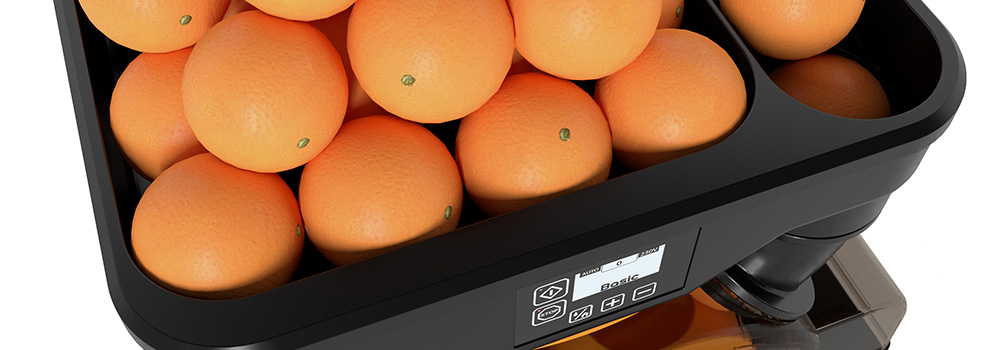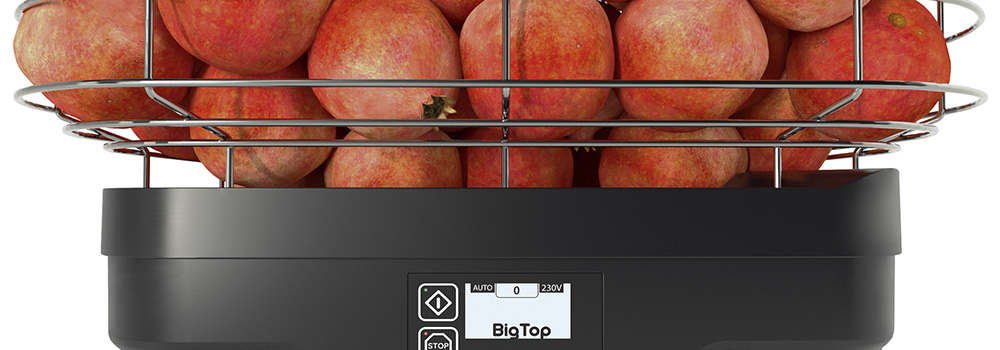Fri, 20 Sep 2024 10:00:00 +0200

News
Manual vs. Automatic feeder: Which is best for your business?
20/09/2024

When choosing a professional juicer, one of the most important decisions is selecting between a manual feeder or an automatic feeder.
At Zumoval, we offer both options to meet the specific needs of our customers.
Below, we outline the advantages and disadvantages of each type of head to help you make the best decision for your business.
Advantages of the manual feeder
The manual head is ideal for businesses that require a lower volume of juice production. Here are its key benefits:
While the manual head has its benefits, there are also some drawbacks to consider:
Advantages of the automatic feeder
On the other hand, the automatic head is the ideal choice for businesses that need to produce large volumes of juice in short periods of time. Here are its key advantages:
Despite its many benefits, automatic heads also have some points to consider:
Which Option Is Best for Your Business?
The choice between a manual or automatic head will largely depend on your type of business and the volume of juice you need to produce.
If you run a small restaurant or a local business with moderate demand for fresh juice, a manual juicer might be the most suitable option, as it allows you to control the process at a lower cost.
If you manage a hotel, supermarket, or business with high customer traffic and continuous demand for juice, an automatic juicer will help maintain efficient, consistent production, saving time and optimizing resources.
At Zumoval, we are committed to offering the best solution for your business. Contact us for more information about our models and discover how we can help you find the perfect juicer to improve your fresh juice production.
At Zumoval, we offer both options to meet the specific needs of our customers.
Below, we outline the advantages and disadvantages of each type of head to help you make the best decision for your business.
Advantages of the manual feeder
The manual head is ideal for businesses that require a lower volume of juice production. Here are its key benefits:
- Lower initial investment: Juicers with a manual head tend to be more affordable than automatic models. This makes them an excellent option for businesses that are just starting out or have moderate juice consumption.
- Simplified cleaning process: With fewer moving parts and a simpler design, the manual head is easier and faster to clean, making it more practical for smaller operations.
While the manual head has its benefits, there are also some drawbacks to consider:
- Dependence on human labor: The manual process requires the operator to load each piece of fruit, leading to a higher workload and less efficiency during peak hours.
- Slower production speed: For businesses with high demand, a manual head might not be the best option, as it takes more time and doesn't allow for continuous juice production.

Advantages of the automatic feeder
On the other hand, the automatic head is the ideal choice for businesses that need to produce large volumes of juice in short periods of time. Here are its key advantages:
- High production capacity: Automatic juicers from Zumoval, like the FastTop model, can process up to 45 oranges per minute. This makes them perfect for supermarkets, hotels, or service stations with high demand for fresh juice.
- Greater convenience and efficiency: With an automatic head, the operator doesn't need to load each fruit individually. The system includes a feeder that processes up to 25 kg of fruit continuously. This not only improves efficiency but also reduces the need for manual labor.
- Faster return on investment: Since automatic juicers can produce a high quantity of top-quality juice in less time, they provide a quicker return on the initial investment.
Despite its many benefits, automatic heads also have some points to consider:
- Higher initial investment: Automatic models usually have a higher cost compared to manual ones, which might be a concern for businesses with tighter budgets.
- More complex cleaning process: Automatic systems have more components, meaning routine cleaning can take longer. In case of a breakdown, repair costs might also be higher. However, at Zumoval, all our juicers are designed with high-quality parts, such as steel gears, which minimize the risk of malfunctions and extend the machine's lifespan.

Which Option Is Best for Your Business?
The choice between a manual or automatic head will largely depend on your type of business and the volume of juice you need to produce.
If you run a small restaurant or a local business with moderate demand for fresh juice, a manual juicer might be the most suitable option, as it allows you to control the process at a lower cost.
If you manage a hotel, supermarket, or business with high customer traffic and continuous demand for juice, an automatic juicer will help maintain efficient, consistent production, saving time and optimizing resources.
At Zumoval, we are committed to offering the best solution for your business. Contact us for more information about our models and discover how we can help you find the perfect juicer to improve your fresh juice production.

